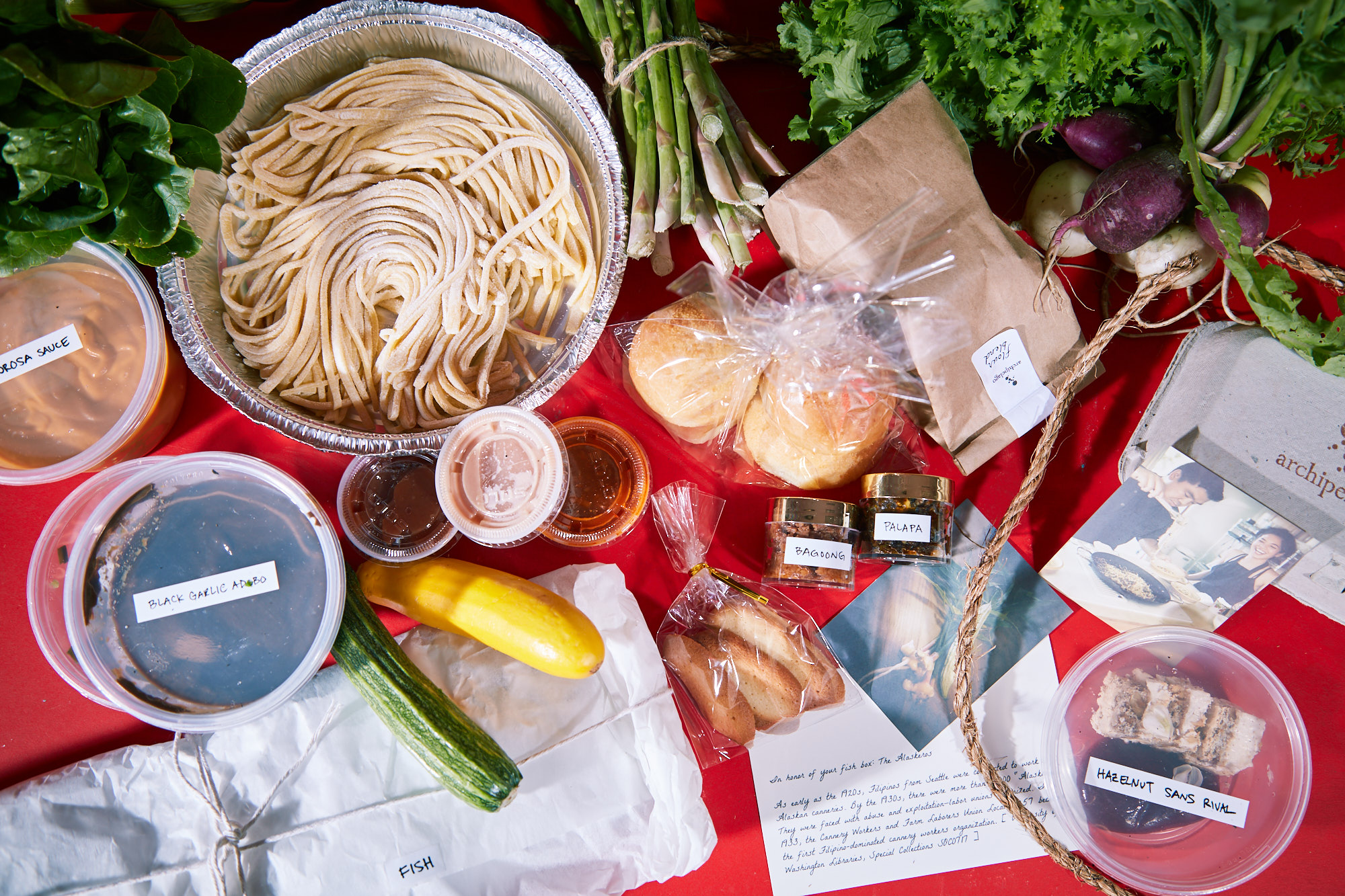When takeout takes
you across the world
When takeout takes
you across the world
When takeout
takes you across
the world
As restaurants scrambled to serve their customers during quarantine, Archipelago innovated with a fresh take on a Filipino immigrant tradition.
Story by Julie Davidow | Photo by Quinn Russell Brown | June 26, 2020

On a recent night in quarantine, my family of three stood at our kitchen counter tearing apart buttery pandesal, smothering each bite of the Filipino rolls with berry and peach jelly. The pandesal came in a balikbayan box from Archipelago, an acclaimed Filipino restaurant opened by UW alumni Amber Manuguid and Aaron Verzosa in 2018.
After Washington state shut down in-person dining due to COVID-19 in March, the Hillman City restaurateurs started packing to-go containers with pork, fish, hand-cut noodles, preserves, family photos, tidbits of Filipino American history, fresh vegetables and shrimp paste to share the tradition of balikbayan boxes with their customers. The care packages carry the memories and hopes of families living apart. Filipino immigrants fill balikbayan boxes with food, mementos, trinkets and treats—treasures of a new life abroad for loved ones in the Philippines.
Every immigrant family knows the pain of separation and the yearning to connect when so much of what you love remains physically out of reach. Food often does that work. My Costa Rican grandfather regularly cooked gallo pinto, a simple dish of black beans, rice and onions, for his wife and children. They ate it together in their stucco home on a street of single-family houses and tidy lawns in Southern California, thousands of miles from where he grew up watching monkeys play in the jungle behind his house. He left Costa Rica, his parents and most of his eight siblings in 1938 and returned to visit only a handful of times.
But he returned to gallo pinto at least once a week. My mother made it for me, and I relied on it as a cheap and filling meal to get through college. Then I forgot about it. Costa Rica is not known for its cuisine and with so many other flavors and recipes to discover, black beans, rice and onions felt more like a chore than a delight. Until quarantine.

What’s in the box: Noodles, fish, sauces, stories, locally grown fresh vegetables and much more.
About three weeks in, I cooked one of the bags of beans I stashed during the early days of Washington’s shelter-in-place order. I remembered the sizzle of the diced red onion hitting the pan, the scrape of my grandfather’s spoon as he toasted the rice in hot oil, and the inky beans tinting the rice with their black dye. Gallo pinto felt like a tether to the places I could no longer go—my grandfather’s kitchen, my childhood, the world before the pandemic.
On this night, I found an unexpected connection to past struggles tucked into the balikbayan box. Among the whole fish, produce, expertly prepared sauces and baked goods, Manuguid and Verzosa included a photo of Filipino cannery workers in Alaska. In 1933, the Alaskeros—many of whom came from Seattle for the seasonal work—organized a union to challenge the exploitation of immigrant laborers.
The Alaskeros’ nearly century-old story of collective action echoes urgent calls for justice in the present. On this night, with more Black lives lost to police violence and an unchecked virus disproportionately killing Black and brown people, the image reminded me of the power of voices raised in protest demanding change.
“As people of color, we know so much of what we fight for is both possible and built on the activism of the Black community,” Manuguid and Verzosa wrote on Archipelago’s Instagram page on June 4. The couple is donating a portion of their sales to Black Lives Matter and the Filipino Senior Living Program in Seattle. “We must continue to stand together to protect the marginalized, to condemn the brutality, and to continue to push for progress.”